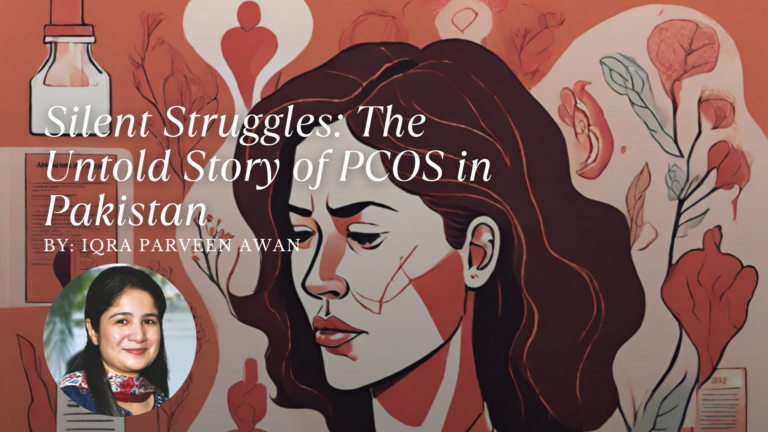By: Iqra Parveen Awan
“I have not been having my periods properly for the past few months and have also gained weight, but I don’t know what to do.” This is a common question asked by many girls in this country. Such conversations often begin with complaints about health and either end with totkas or more complaints.
According to a survey conducted in 2017, more than 52% of the female population in Pakistan is suffering from PCOS. Unfortunately, there is no more recent data available, but medical professionals estimate that the figures have increased to approximately 70-80%. Nearly every girl experiences issues concerning their sexual and reproductive health at least once in her life.
So what exactly is PCOS?
PCOS (Polycystic Ovarian Syndrome) is a hormonal disorder that may or may not result in the formation of cysts in a woman’s ovaries. It can manifest in a variety of symptoms, affecting both the physical and psychological well-being of women.
What are the symptoms of PCOS?
According to Johns Hopkins Medicine, the symptoms of PCOS may include:
- Missed periods, irregular periods, or very light periods
- Enlarged ovaries or ovaries with many cysts
- Excess body hair, including the chest, stomach, and back (hirsutism)
- Weight gain, especially around the abdomen
- Acne or oily skin
- Male-pattern baldness or thinning hair
- Infertility
- Small pieces of excess skin on the neck or armpits (skin tags)
- Dark or thick skin patches on the back of the neck, in the armpits, and under the breasts
How is PCOS diagnosed?
Irrespective of the conditions for diagnosis in Pakistan, PCOS is typically diagnosed using ultrasound and blood tests. However, in Pakistan, pervasive social stigmas and taboos make simple diagnosis much more difficult, compounded by societal pressures and judgments. Worldwide, the situation is challenging due to a lack of proper research and awareness. According to the World Health Organization (WHO), almost 70% of cases go undiagnosed globally.
Pakistan vs.PCOS?
If we consider events like Pakistan vs. India cricket matches, they garner significantly more attention in a single day than the focus we allocate to women’s health, especially PCOS. Despite more than half of the female population grappling with it and every other girl experiencing related symptoms, open discussions and acknowledgment of PCOS as a women’s health crisis remain elusive.
Pakistan is facing a critical situation where conditions like PCOS are dangerously close to becoming normalized due to insufficient healthcare facilities and awareness efforts. This normalization poses a serious threat to women’s well-being in a society where female fertility is closely tied to societal roles. Since PCOS can directly impact fertility, its prevalence exacerbates existing challenges faced by women in Pakistan.
During my PCOS Awareness Sessions, a young woman asked me, “I’m getting married in three months and just got diagnosed with PCOS. Should I delay my wedding?”
This question underscores the ongoing challenges and uncertainties faced by women in my country due to their lack of knowledge about this health issue.
Iqra Parveen Awan
Founder of PCOS HELPS, PCOS CLINIC & Awaaz Pakistan



